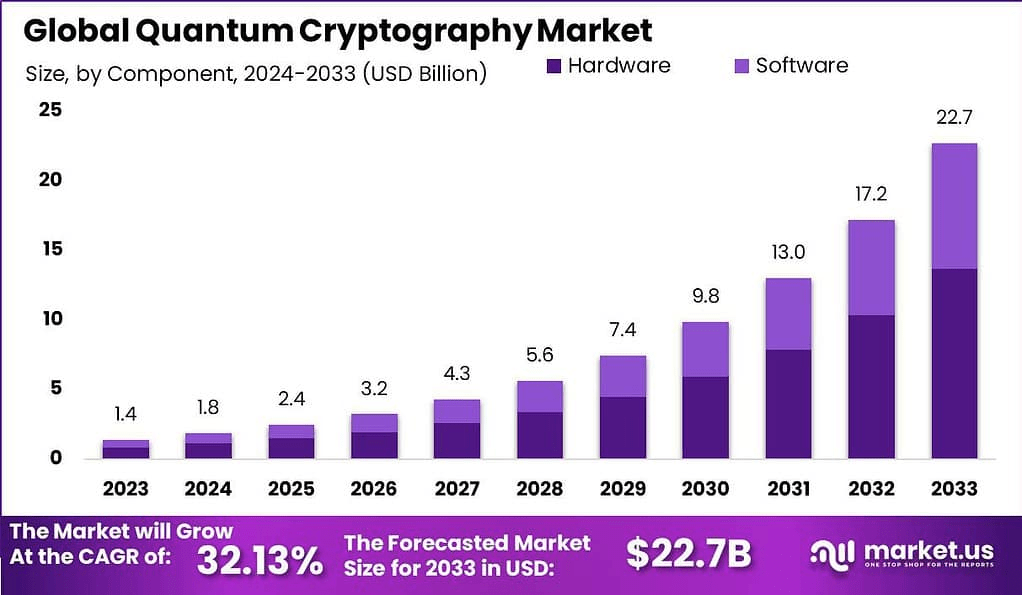Introduction
The Quantum Cryptography Market is rapidly gaining traction as global concerns over cybersecurity, data privacy, and the potential threat of quantum computing to classical encryption methods intensify. Unlike traditional cryptographic techniques, quantum cryptography—particularly quantum key distribution (QKD)—leverages the principles of quantum mechanics to ensure data security that is theoretically unbreakable. As sectors such as defense, finance, and healthcare face increasing data vulnerability, quantum cryptography offers a future-proof solution that secures communications against both classical and quantum-based attacks, positioning itself as a critical component of next-generation cybersecurity infrastructure.

Key Takeaways
The market is witnessing strong growth driven by rising cyber threats, increased investment in quantum technologies, and government-backed initiatives for secure communications. Quantum cryptography’s ability to detect eavesdropping in real time gives it a significant edge over conventional encryption. While adoption is still in its early stages due to cost and complexity, sectors such as military, financial services, and critical infrastructure are pioneering implementation. Key trends include the rise of quantum networks, integration with 5G, and hybrid security frameworks that combine classical and quantum techniques for near-term protection.
Component Analysis
Quantum cryptography solutions consist of quantum key distribution (QKD) systems, quantum random number generators (QRNGs), photon detectors, quantum repeaters, and encryption hardware/software. QKD is the cornerstone, enabling secure transmission of encryption keys over fiber or satellite. QRNGs produce true randomness essential for robust key generation. Photon detectors and quantum repeaters facilitate long-distance transmission of quantum information. These components are increasingly being integrated into existing network infrastructure, particularly in data centers, satellite links, and telecom backbones, enabling secure communication over potentially untrusted channels.
Service Analysis
Services in the quantum cryptography space include quantum network deployment, QKD-as-a-Service, consulting and integration, training, and post-quantum cryptographic readiness assessments. Telecom and cybersecurity firms are offering managed quantum encryption solutions for enterprises seeking end-to-end data protection. As awareness grows, service providers are helping businesses prepare for the post-quantum era by evaluating vulnerabilities and developing hybrid encryption strategies. Cloud-based models are also emerging, allowing clients to access quantum-grade security without investing in expensive infrastructure. Ongoing R&D and collaboration with research institutions form a critical part of these service offerings.
Key Player Analysis
Key players in the quantum cryptography market include ID Quantique, Toshiba, QuintessenceLabs, Quantum Xchange, IBM, BT Group, and Qasky. ID Quantique is a global leader in QKD systems and QRNG technology, while Toshiba focuses on integrating quantum security into commercial fiber networks. Quantum Xchange is developing quantum-safe key distribution solutions for enterprise use, and IBM is driving post-quantum cryptography standards in tandem with quantum computing innovation. QuintessenceLabs offers hybrid security solutions blending quantum encryption with classical frameworks. Strategic collaborations, government contracts, and advances in photonics are fueling competitive growth and market expansion.
Top Market Leaders
- ID Quantique
- QuintessenceLabs
- MagiQ Technologies (acquired by Raytheon Technologies Corporation)
- Toshiba Corporation
- Qubitekk
- QuantumCTek Co., Ltd.
- PQ Solutions
- Infineon Technologies AG
- Anhui Qasky Quantum Technology Co. Ltd.
- NEC Corp.
- Microsoft Corp.
- Other Key Players
Conclusion
Quantum cryptography is emerging as the gold standard for future-proof cybersecurity in an era where traditional encryption is increasingly vulnerable. As quantum technologies evolve and become more commercially viable, the market will play a vital role in securing sensitive communications across sectors—ushering in a new era of data integrity, trust, and digital resilience.
The macro analyst desk brings highly sought after financial news based on market analysis, insider news and company filings.
